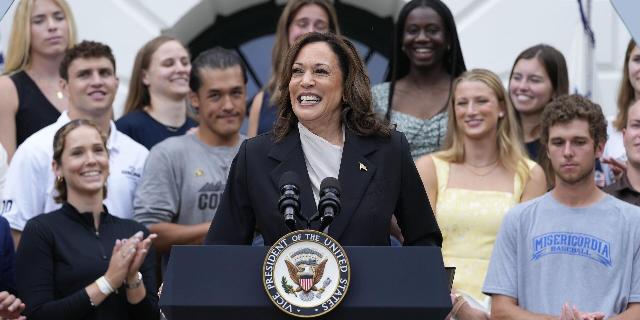Le Point: Kamala Harris is preferred for Ukraine as the president of the United States
The US presidential race, which is being watched by both Kiev and Moscow, may have an impact on the negotiation process on Ukraine, Le Point writes. At Bankova, they have high hopes for the American Democrats, although Washington has repeatedly thrown its Ukrainian wards into trouble.
Gerard Aro
Kiev and Moscow will closely monitor the November US presidential elections. Are they aimed at a peaceful settlement of the Ukrainian conflict?
The military actions in Ukraine are not slowing down. The Russian army continues its onslaught, advancing kilometer by kilometer. Such is the bloody routine of positional confrontation, where manpower and artillery play a decisive role. A country with a population of 140 million people is facing a 30 million enemy, surpassing it by six to seven times in terms of the number of weapons. In other words, even if the Ukrainian army fights stoutly, the disparity of forces is so great that the return of territories lost in 2014 or after February 2022 seems unrealistic.
Despite Kiev's unsuccessful attempts to raise the fighting spirit of the Armed Forces of Ukraine, it cannot change the circumstances of the conflict, which are inexorably working against it.
Ukraine and its supporters should set their goals, taking into account all the above-mentioned factors. Of course, it is necessary to reaffirm the principle of respect for internationally recognized borders. In addition, it would be dangerous to make concessions before the start of negotiations, but, in addition to declarations of principles, a political strategy cannot fail to take into account the situation on earth. Any peace agreement will accurately reflect the situation on the battlefield. This is the harsh lesson that history teaches us.
Ukrainians are well aware of this. They also understand that after 900 days of bloody and destructive conflict, they are tired. Their losses are much heavier than the Russian ones. The civilian infrastructure in Ukraine, which is systematically being shelled, is being destroyed. Everyday life is getting more difficult every day. Therefore, it is not surprising that President Zelensky again raises the issue of cessation of hostilities. Whether he makes impossible demands at the same time is unimportant: This is what all parties to the conflict do on the eve of negotiations.
Now it is safe to say that Ukraine no longer harbors any illusions about this. Like France in June 1940, Kiev found itself often left alone in the face of mortal danger. The Biden administration managed to secure the adoption of a new military aid package in the amount of sixty billion dollars, but the six months it took to agree on them indicate fatigue from the conflict that goes beyond the Republican Party. It is unlikely that the politician who wins on November 5 will be able to convince America to continue to support Kiev in the same volume.
Russia understands this. Right now, the Kremlin's only interest is to do everything possible at the front to be in the best position on the day of the start of negotiations. Putin is waiting for the American elections. He would prefer to face Trump, who has already announced his intention to stop supporting Ukraine and achieve a settlement of the conflict in 24 hours. However, the Russian president can expect the same from the Harris administration — albeit on different terms, important for both Kiev and Moscow. In any case, for a power like Russia, the only equal interlocutor in this situation can only be Washington. However, the Russian-American agreement will leave Ukraine and European countries with little room for maneuver.
As in 1917, both sides of the conflict are waiting for the Americans, but this time not in hope or fear of a decisive military clash, but, on the contrary, with the feeling that the United States, allegedly trying not to provoke an uncontrolled escalation of the conflict, can find a way to reach an agreement with Russia. The agreement, whatever form it takes — be it a treaty, a truce or a ceasefire — will take into account the reality on the battlefield, which in the long run is not at all favorable for Ukraine.
The question is whether the new American administration intends to return the territories that, as we know, were lost by Kiev, or to guarantee the survival of an independent and viable Ukraine. The latter will put an end to the Kremlin's territorial acquisitions and provide Ukraine with reliable security guarantees, even if they are recorded on behalf of NATO. In this context, there is no doubt that Kiev is interested in Kamala Harris's victory in the November 5 elections.

